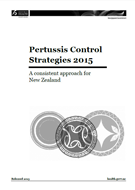
Summary
Pertussis is a highly contagious respiratory disease characterised by a prolonged paroxysmal cough (whooping cough). The focus of pertussis immunisation and surveillance is to protect those most at risk from severe disease (those aged under one year).
New Zealand experienced a major pertussis outbreak, peaking from August 2011 to December 2013, resulting in the hospitalisation of hundreds of infants aged under one year and the death of three unimmunised children, including two infants too young to be immunised.
In April 2015 the Ministry of Health held a workshop to bring together expertise and those with experience from this epidemic to discuss pertussis disease control strategies and a consistent approach for New Zealand. Gains have been made in the infant primary immunisation series, but pertussis is still a major public health issue. The Ministry of Health wanted to assess the available data and strategies with the aim of minimising the impact of future outbreaks on those most vulnerable.
Key areas of focus were: the National Immunisation Schedule, maternal immunisation, improving immunisation coverage, surveillance, and communications for health professionals and the public.
In this publication we share the discussions held at this workshop.
